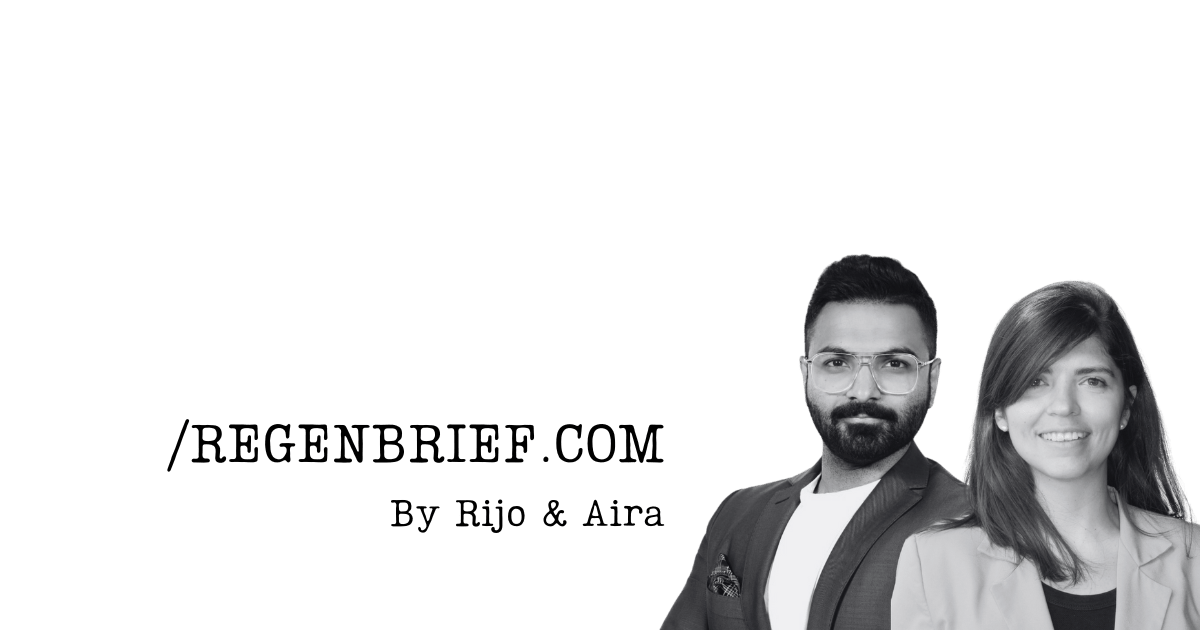"The ultimate test of a moral society is the kind of world that it leaves to its children."
Dear RegenBrief reader,
If climate change didn't exist, would you still choose a sustainable life?
We've trained ourselves to think sustainability starts with crisis.
Climate emergency. Resource depletion. Species extinction.
But what if sustainability isn't a response to breakdown—but an expression of something fundamentally human?
If there were no climate crisis, no melting ice caps, no carbon budgets... would you still choose to live sustainably?
Your answer reveals whether you see sustainability as:
An external obligation (fix the planet)
Or an internal orientation (how humans naturally thrive)
The Evidence We've Been Ignoring
Consider what we already know about human thriving:
Indigenous wisdom spans 65,000+ years of regenerative living—long before anyone measured CO2 levels
The Blue Zones research shows the world's longest-living populations naturally practice what we now call "sustainability"—local food, community connection, purposeful work, minimal waste
Neuroscience studies reveal that humans experience measurable stress reduction in natural environments and when living in alignment with natural cycles
Economic data shows that gift economies and circular systems existed for millennia before industrial extraction models
The Gap We've Created:
We've made sustainability about sacrifice instead of recognizing it as how humans are designed to live.

What If We've Been Measuring Wrong?
Challenge the Current Story:
What if the climate crisis isn't the reason for sustainability—but the inevitable result of forgetting how to be human?
Instead of asking "How do we reduce harm?"
Ask: "How do we design for thriving—for all life?"
Instead of measuring carbon footprints alone
Measure: Connection to place, community resilience, regenerative contribution
The Real Question: Not "What must we sacrifice?" but "What do we gain when we live in right relationship with life?"


Where to Start: Living the Questions
For Every Leader Reading This:
🌱 Question Your Why: Write down why sustainability matters to you. Remove all references to climate, crisis, or planetary emergency. What's left? That's your true north.
🌱 Audit Your Language: For one week, speak about sustainability without using crisis terminology. Notice what shifts in your thinking and others' responses.
🌱 Practice Regenerative Decision-Making: For your next three decisions (personal or professional), ask "What choice increases life?" rather than "What choice reduces harm?"
🌱 Study Thriving Systems: Spend 20 minutes learning about one traditional practice that sustained communities for generations—permaculture, gift economies, collective governance, circular craft traditions.
🌱 Design for Wholeness: In your next project or initiative, start with "How do we design for human and ecological thriving?" instead of "How do we minimize negative impact?"
What's Happening Right Now
Three signals that the narrative is already shifting:
🟡 New research in environmental psychology shows people motivated by "thriving" rather than "crisis" demonstrate 60% higher long-term behavior change rates.
🟢 Ancient wisdom meets policy - The Māori concept of "mauri" (life force in all things) is being integrated into New Zealand's legal framework, giving rivers and forests legal rights—not as crisis response, but as recognition of inherent value.
🔴 The burnout warning - 73% of sustainability professionals report exhaustion, with many citing "doom messaging" as a primary stress factor. Our current narrative may be working against us.
This Week's Experiment
Try the "Abundance Approach" for 7 days:
Make every sustainability choice from abundance rather than scarcity.
Choose local food because it tastes better (not because transport is bad)
Choose walking because it feels good (not because cars pollute)
Choose repairing because craftsmanship brings joy (not because waste is evil)
Notice what shifts in your energy and relationships.
📚 This Week's Resource: "Original Instructions" by Melissa K. Nelson—indigenous perspectives on living in reciprocity with all life
💭 Question for LinkedIn: "What if sustainability isn't about saving the planet, but about remembering how to be fully human?"
Let's Explore This Together
Have you experienced sustainability as natural and joyful rather than dutiful?
Reply to this email with your story to be featured and expand the conversation.
Coming Up
Next week: "The Economics of Enough: What Happens When We Design for Sufficiency Instead of Growth?"
This is more than sustainability.
This is about remembering what it means to be human.
This is regeneration.
Stay regenerative,
— The RegenBrief Team
regenbrief.com | @regenbrief
Let Us Help You Lead the Shift
Whether you're in strategy, ESG reporting, operations or innovation—
This is your moment to shape not just a better business, but a better future.
Curious where regeneration fits into your model?
Let’s explore the possibilities together.
This is more than sustainability.
This is life-centered design.
This is regeneration.



